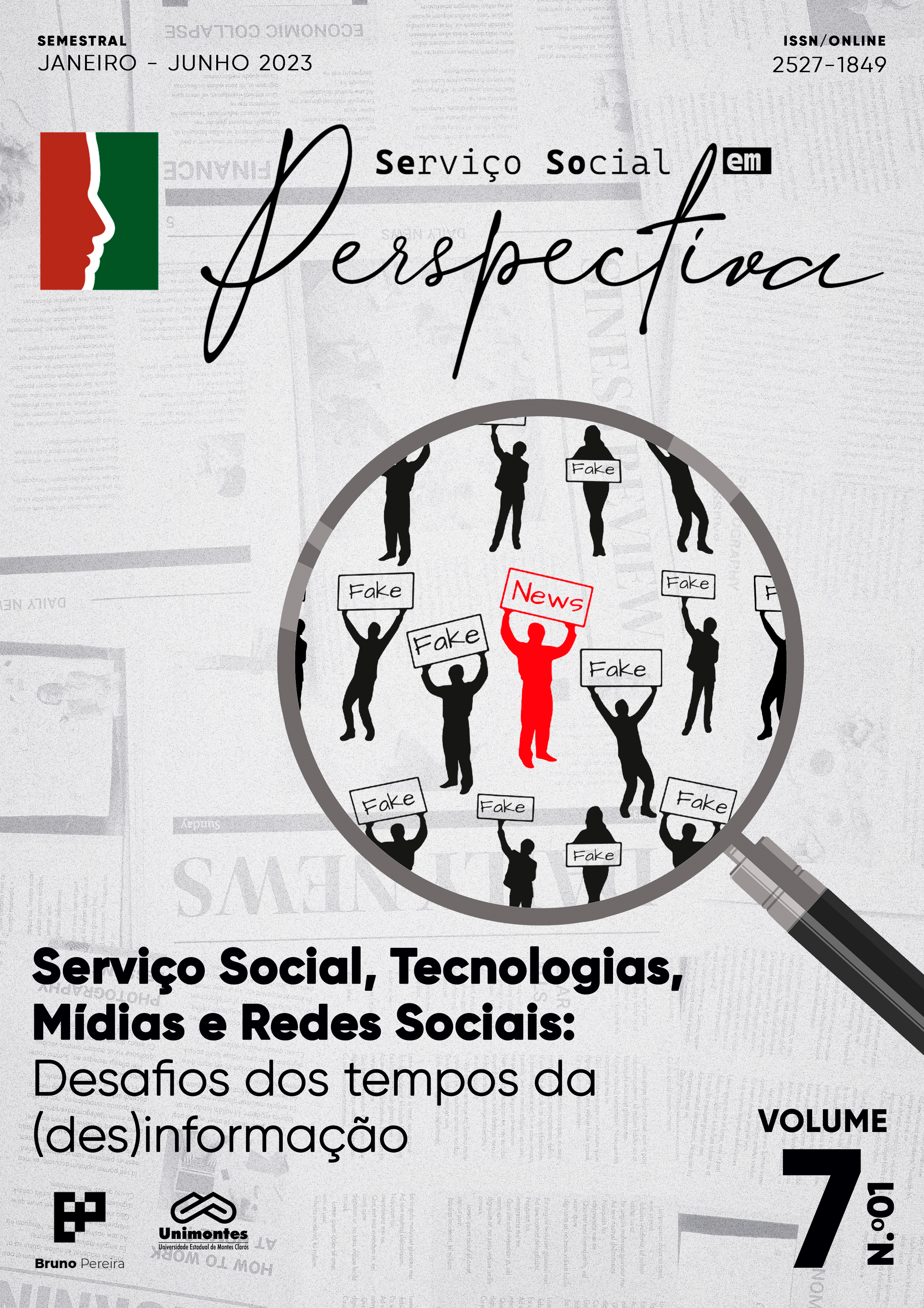A CRITICAL-REFLECTIVE VIEWABOUT ICTS
THE “CASE” OF ITS INCORPORATION BY SOCIAL WORK
DOI:
10.46551/rssp.202303Keywords:
Trabalho, Capitalismo, TICs, Serviço SocialAbstract
This paper aims to analyze Information and Communication Technologies (ICTs) and their incorporation by Social Work, especially from the context of Covid-19, when the theme of technology appears in the particularity represented in the "mediation" of relationships social, determined by the need for social isolation. Supported by historical-dialectical materialism, through bibliographic research, it demonstrates that technology reveals man's active attitude towards nature. Based on the work's premise, it intends to reveal the process in which the changes in the productive forces dictate the course of human history. The use of technology, therefore, not being neutral in itself, results from the need to intensify the work processes that cause the exploitation of the working class. The study also demonstrates that the demand for fluidity and adaptability of work to flexibility is not a novelty of the present time. Far from it, it derives from the permanent contradiction of capitalism, caused by the purchase and sale of the workforce, to which ICTs are added. In view of this, it reflects the “chance” of the incorporation of technologies by Social Work, in the context of the global pandemic and structural crisis, indicating that the counterface of innovations that implies the intensification of the precariousness of work relationships must be prevented. It notes, through the ethical-political project, that work, by launching humanity into a historical process embodied by development beyond itself, is the basis of technology and that its use can be converted in favor of the interests of those who created it: The man.
Downloads
References
ANTUNES, Ricardo. Coronavírus [Recurso eletrônico]: o trabalho sob fogo cruzado. 1. ed. – São Paulo: Boitempo, 2020.
BARBOSA, Rosângela. Trabalho e mediação digital: captura de tempo e erosão de direitos. In: Crise, ultraneoliberalismo e desestruturação de direitos. Uberlândia: Navegando Publicações, 2020. p. 69-104.
CFESS. Teletrabalho e Teleperícia: orientações para assistentes sociais no contexto da pandemia. Brasília, 2020. [Acesso em 25 de março de 2021]. Disponível em: http://www.cfess.org.br/arquivos/Nota-teletrabalho-telepericiacfess.pdf
__________. Código de Ética Profissional do Assistente Social. 1993.
HARVEY, David, 1935. Para entender o capital; [Tradução de Rubens Enderle]. – São Paulo, SP: Boitempo, 2013.
HUWS, Ursula. A formação do cibertariado: trabalho virtual em um mundo real. Campinas: Unicamp, 2017.
IAMAMOTO, Marilda Vilela, CARVALHO, Raul de. Relações sociais e serviço social no Brasil: esboço de uma interpretação histórico-metodológica. – 23. ed. – São Paulo, Cortez; [Lima, Peru]; CELATS, 2008.
LUCE, Mathias Seibel. Teoria marxista da dependência: problemas e categorias – uma visão histórica. 1. ed. – São Paulo: Expressão Popular, 2018.
MARX, Karl. O capital: crítica da economia política: Livro I: o processo de produção do capital; [Tradução de Regis Barbosa e Flávio R. Kothe]. – São Paulo: Editora Nova Cultural Ltda., 1996.
_______. O capital: crítica da economia política: Livro I: o processo de produção do capital; [Tradução de Rubens Enderle]. – São Paulo: Boitempo, 2013.
MÉSZÁROS, Para além do capital: rumo a uma teoria da transição. Tradução de Paulo Cezar Castanheira, Sérgio Lessa. 1. ed. revista. – São Paulo: Boitempo, 2011.
MONTAÑO, Carlos; DURIGUETTO, Maria Lúcia. Estado, classe e movimento social. 1. ed. São Paulo: Cortez, 2010.
NETTO, José Paulo. Capitalismo monopolista e serviço social. 7. ed. – São Paulo, Cortez, 2009.
PINTO, Álvaro Vieira. O conceito de tecnologia. Rio de Janeiro: Contraponto, 2005.
_______. Transformações societárias e Serviço Social Notas para uma análise prospectiva da profissão no Brasil. In: Revista Quadrimestral de Serviço Social Ano XVII – nº 20 – abril de 1996.
Organização Mundial da Saúde. Estatísticas mundiais de saúde 2022: monitoramento da saúde para os ODS, desenvolvimento sustentável. Genebra: Organização Mundial da Saúde; 2022.
Silva, Jaqueline Lima da. O TRABALHO DA/O ASSISTENTE SOCIAL COMO FORMA DE TRABALHO IMPRODUTIVO ASSALARIADO: uma análise a partir da expansão do Serviço Social na Rede Federal de Educação Profissional, Científica e Tecnológica no período 2003-2018. 2022. 210 f. Tese (Doutorado em Serviço Social) – Universidade Federal de Alagoas, Alagoas, 2022.
União Internacional de Telecomunicações. (2022, 10 de março de 2022).
VELOSO, Renato. Serviço Social, tecnologia da informação e trabalho. São Paulo: Cortez, 2011.











